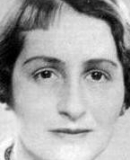
Vera Brittain
Vera Brittain
Writer
Biography
Vera Brittain born 29 december 1893 in Newcastle-under-Lyme, Brittain was the daughter of a well-to-do family who owned paper mills in Hanley and Cheddleton. She was the daughter of a paper manufacturer, Thomas Arthur Brittain (1864–1935) and his wife, Edith Bervon Brittain (1868–1948), and her only brother was her closest companion. When she was 18 months old, her family moved to Macclesfield, Cheshire, and when she was 11 years old, they moved again; to the spa town of Buxton in Derbyshire. From the age of 13, she attended boarding school at St Monica's, Kingswood, Surrey where her aunt was the principal. Overcoming her father's initial objections, she read English Literature at Somerville College, Oxford, delaying her degree after one year in the summer of 1915 to work as a Voluntary Aid Detachment (VAD) nurse for much of the First World War, initially in Buxton and later in London, Malta and France. Her fiancé Roland Leighton, close friends Victor Richardson and Geoffrey Thurlow, and her brother Edward Brittain were all killed in the war. Their letters to each other are documented in the book Letters from a Lost Generation. In one letter Leighton speaks for his generation of public school volunteers when he writes that he feels the need to play an "active part" in the war. Returning to Oxford after the war to read history, Brittain found it difficult to adjust to life in postwar England. She met Winifred Holtby, and a close friendship developed, both aspiring to become established on the London literary scene. The bond lasted until Holtby's death from renal failure in 1935. Other literary contemporaries at Somerville included: Dorothy L. Sayers, Hilda Reid, Margaret Kennedy, and Sylvia Thompson. In 1925, Brittain married George Catlin, a political scientist (1896–1979). Their son, John Brittain-Catlin (1927–1987), with whom Vera had a difficult relationship, was an artist, painter, businessman, and the author of the autobiography Family Quartet, which appeared in 1987. Their daughter, born 1930, is the former Labour Cabinet Minister, now Liberal Democrat peer, Shirley Williams, one of the "Gang of Four" rebels on the right-wing of the Labour Party who defected to found the SDP in 1981. Brittain's first published novel, The Dark Tide (1923), created scandal as it caricatured dons at Oxford, especially at Somerville. In 1933, she published the work for which she became famous, Testament of Youth, followed by Testament of Friendship (1940)—her tribute to and biography of Winifred Holtby—and Testament of Experience (1957), the continuation of her own story, which spanned the years between 1925-1950. Vera Brittain wrote from the heart, basing many of her novels on actual experiences and actual people. In this regard, her novel Honourable Estate (1936) was autobiographical, dealing with Brittain's failed friendship with the novelist Phyllis Bentley, her romantic feelings for her American publisher George Brett Jr, and her brother Edward's death in action on the Italian Front in 1918. Brittain's diaries from 1913–17 were published in 1981 as Chronicle of Youth. Some critics have argued that Testament of Youth differs greatly from Brittain's writings during the war, suggesting she was more in control when writing retrospectively. In the 1920s, she became a regular speaker on behalf of the League of Nations Union, but in June 1936 she was invited to speak at a peace rally in Dorchester, where she shared a platform with Dick Sheppard, George Lansbury, Laurence Housman, and Donald Soper. Afterwards, Sheppard invited her to join the Peace Pledge Union. Following six months' careful reflection, she replied in January 1937 to say she would. Later that year, Brittain also joined the Anglican Pacifist Fellowship. Her newly found pacifism came to the fore during World War II, when she began the series of Letters to Peacelovers. She was a practical pacifist in the sense that she helped the war effort by working as a fire warden and by travelling around the country raising funds for the Peace Pledge Union's food relief campaign. She was vilified for speaking out against saturation bombing of German cities through her 1944 booklet Massacre by Bombing. In 1945, the Nazis' Black Book of nearly 3,000 people to be immediately arrested in Britain after a German invasion was shown to include her name. From the 1930s onwards, Brittain was a regular contributor to the pacifist magazine Peace News. She eventually became a member of the magazine's editorial board and during the 1950s and 1960s was "writing articles against apartheid and colonialism and in favour of nuclear disarmament". In November 1966, she suffered a fall in a badly lit London street en route to a speaking engagement. She attended the engagement, but afterwards found she had suffered a fractured left arm and broken little finger of her right hand. These injuries began a physical decline in which her mind became more confused and withdrawn. Vera Brittain never fully got over the death in June 1918 of her beloved brother, Edward. She died in Wimbledon on 29 March 1970, aged 76. Her will requested that her ashes be scattered on Edward's grave on the Asiago Plateau in Italy – "...for nearly 50 years much of my heart has been in that Italian village cemetery"— and her daughter honoured this request in September 1970.
For more information press link below:
Filmography
Screenwriter
Rəy bildirmək üçün Giriş et və ya Qeydiyyatdan keç
